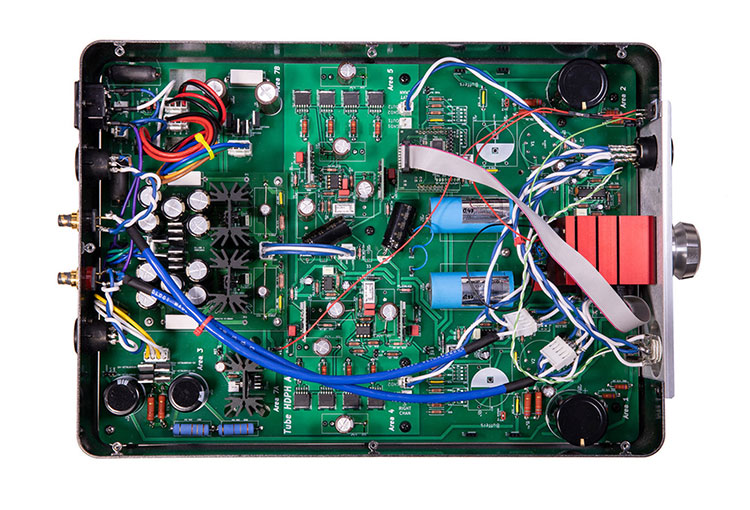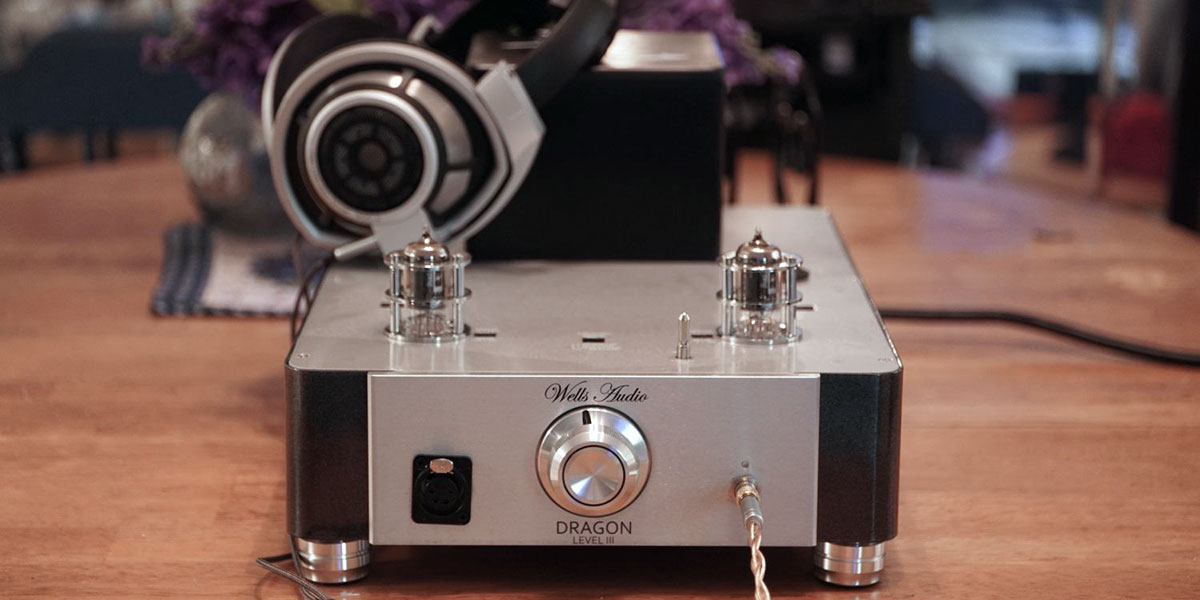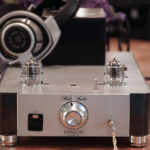The Wells Audio Dragon is a high-end hybrid tube amplifier capable of up 5 watts of power with up to 1 amp of current drive. It is priced from $1500 up to $5500.
Disclaimer: The Wells Audio Dragon that was sent to us is a loan that will be sent back after this review. We thank Wells Audio for their support and for giving us this opportunity.
To read other amplifiers we have reviewed on Headfonics click here.
Note, this review follows our new scoring guidelines for 2021 which you can read up on here.
Today, I will be taking a listen to Wells Audio TOTL version of the Dragon Amplifier, the Dragon Level III, which sells for $5,500.
The Wells Audio Dragon Level III is a monster tube amplifier, to say the very least. I have never had the chance to hear any previous Wells Audio products in my history, so this was one hell of a tease and treat for me.
Dropping out of Campbell, California (USA), the Dragon Level III is the creation of Jeff Wells, a pioneer of amp architecture and a mad audiophile scientist.
You can also select Dragon Level 1 starting at $1500 with 500 milliamps of gain and Dragon Level II also with 1amp of current. The full specs of the range are available on the Wells Audio website.
This company offers some extremely expensive amplifiers of various types. So, if you are into the top-of-the-line headphone amplifier scene, this is a website you should peruse and see what tickles your fancy.
If the Dragon Level III sounds as good as it does, I can’t even imagine what the others sound like!

Tech Highlights
Power
The team at Wells Audio set out with the intent to be able to drive any headphones on the market without any problems whatsoever. It dishes out 5watts with 1amp of drive power. What that means is an excess of headroom in the driving needs of even the hungriest headphones out there.
You won’t have to worry about cranking the dial very high, you’ll have plenty of space left before you max out the volume. More is better, always.
Ground Noise
There haven’t been many amplifiers that I’ve received that are 0-tier silent such as this Dragon Level III. It is, in fact, the deadest silent amplifier I’ve ever heard. And considering it is a tube amplifier with 0 hum factor, that is something we audiophiles have wanted since day one.
This amplifier is so quiet with no audio playing that I questioned just how loud the ambient noise in my listening area actually is and really picked up on the exterior noise more than the internals of the amplifier. That is really, REALLY silent!
Internal Hardware
The Dragon Level III offers a set of 12BH7 and 6DJ8 tubes, both of which I have never tested before. These quality tubes were always beyond my budget; however, I have heard the lower tier family members of these same tubes in various other FAR LESS expensive amplifiers in the past and I enjoyed them a lot for their musicality factor.
And that seemed to have been the name of the game here with Wells Audio’s intent in design. They wanted to and set out to create a highly musical-sounding amplifier. One that isn’t overly metallic or overly clinical in appeal. But rather, one that is hyper smooth, on the fun side, a little vivid, thick, and highly Lucious in physicality factor.
Wells Audio also cryo-treats their tubes for usage with this amplifier, as well as includes a Khozmo Opto Sensor attenuator (and recall, I said it is literally a solid milled piece of aluminum, so it feels like a heavy piece of metal in your hand when you dial up or down).
The dense feeling tube guards are also chrome. The RCA inputs are WBT brand, high-quality stuff. Wells Audio also designed 4 DC noise filters for this amplifier, which again, sound immensely quiet to me.
Design
The amplifier is made of solid metal and weighs a ton. The side panels are made of a high-quality reflective metal that puts out perhaps the most high-class vibe that I’ve ever seen in an amplifier before. It reminds me of walls and flooring on expensive hotel lobbies.
The volume knob is a solid chunk of aluminum and has a very smooth and gliding functionality to it. The power switch is also stiff and pure metal in design and it feels extremely satisfying to turn on and off with a nice sounding and feeling clink effect.
The headphone ports, inputs, and outputs almost feel like they are milled out of a solid piece of metal too. There is 0% wiggle factor when gently placing the cables in and removing them.
In terms of physicality and build materials, this amp takes the cake as the overall best build in an amplifier that I have ever reviewed. This, at least for me, is the new benchmark. I must say, the tube’s protective coverings are the most solid feeling that I’ve ever experienced. I kid you not when I say every piece of this unit feels like a high-quality piece of metal was just milled and chiseled out.
Packaging & Accessories
No accessories are given with this package beyond the stock power cable, which is quite beefy. This Dragon Level III came in a standard cardboard box with foam cutouts to protect the amplifier. It doesn’t come with a supremely fancy package beyond that.
Not that I need or even want one. I don’t think anyone will care about the box after listening to the product. This amplifier is so gorgeous that I would want it brandished on my desk and listening area at all times, never covered or placed in a box unless I was transporting it anyway.
Sound Impressions
Bass
The bass on this Dragon Level III is the smoothest sounding that I’ve ever heard. Out of my Sennheiser HD800, the experience on the low end is finally done justice and it shows just how absurdly snobbish the HD800 really is when it comes to proper amplification needs.
The bass is almost liquid-like, and the typical harsh impact of the HD800 is replaced with a much more focused and effortless physicality factor. Pair this with a softer sounding USB DAC (like a Burson series DAC) and you have yourself a match made in heaven that makes one of the most clinical sounding headphones ever made a sound like it is made for the fun factor.
Musicality is not an absence of realism or effortlessness. To me, the metallic sheen that is often associated with the clinical and accurate headphone rigs is not present in this Dragon Level III, however, the raw fidelity factor is so clean and crisp that it ends up making one of the harshest sounding headphones actually have a softer impact.
Bass is portrayed in a liquid-like physicality, with primal density factor and vividness that makes it seem almost like an entry-level electrostatic headphone. This is the power of proper rig pairing with the HD800. The Dragon Level III is the best sounding amplifier I’ve ever heard for the HD800, with a distant second way down the street being the Airist Audio Heron 5 at 1/6 the price.
Depth Factor
The Bass depth factor is very good on this amplifier. It doesn’t have a bass boost function, yet it performs very well with my Beyerdynamic T5 Gen3.
The bass response of this amplifier is leagues ahead of the Conductor series amplifiers I’ve reviewed recently, side by side comparisons showcase that instantaneously. The depth and raw response factor to slight EQ alteration are exceptionally great on this amplifier.
If you are using MSEB as a control for EQ… lol…have fun. You can tweak MSEB for hours and micro-adjust, and each small micro turn of the dial on your software can be heard and felt on the Dragon. That means the amplifier responds incredibly well to EQ and its bass response is phenomenal.
Midrange
The Dragon Level III presentation is dead-flat. It is neither forward nor recessive. The bass quantity does not exceed the midrange and the midrange does not exceed the treble.
The entire spectrum is perfectly linear unless you boost via EQ and change that yourself. The vocals/midrange of this amplifier is presented similar to a low-end Stax 007 on the Stax 007A amplifier if you have ever heard it. It is not bloomed (meaning, more forward than the mids and bass) so the experience feels a bit more expansive than it actually is.
The end result of this presentation in a physical manner is that the vocal experiences are easy on the ear. You simply do not need to adjust or feel your brain struggling to choose which end of the spectrum to focus on.
The midrange blends so well with the lows and treble that you almost forget you are listening to an HD800 right now, a headphone known for a recessed midrange. Instead, you get a sense of spaciousness and natural breathing between the upper-midrange and lower treble.
This is the nasal zone, of which there isn’t any on the Dragon Level III. This amplifier is the most natural and realistic sounding vocal experience that I’ve ever heard on a dynamic/planar headphone.
Timbre
Treble is portrayed in the most elegant manner possible. I have always felt that the HD800 has a harsh treble headphone until you have an amplifier like this that is set up for a softer appeal and physicality factor.
With the right voltage level and gain setting, the HD800 is again a headphone I want to use all the time and one that doesn’t fatigue my ears. This only happens with a rare few amplifiers out there that I have experienced. It was so hard for me to find one, that I settled on a much lower tier Heron 5 because it meshed so nicely with the HD800.
Swapping other headphones in, such as the T5, I got a sense of moonlight glow in the night sky effect that I longed for many years to find. If you know me, I loved my Tiesto K267’s, probably the most beautiful treble in a non-TOTL headphone ever made. Imagine that on the level of a TOTL with the T5 and this Dragon Level III.
I was in shock at how the top side of the T5 inverted when swapping between the Conductor and this Dragon Level III. Crystalline. Effortless. Non-fatiguing. But, with a sense of sparkle. That rare tonality of a sparkle factor is nailed by Wells Audio.
Staging & Dynamics
I don’t find the Dragon Level III to be more physically wide or tall than the Burson Conductor series amplifiers, for example. However, and this is big, the depth of field factor is significantly deeper and more realistic on the Dragon.
That stage-forward sense is some serious business. It amazes me how much I am really missing on my portable rig and how much of a difference there is between this stage depth of field on this Dragon vs my go-to portable rig, with the SMSL M400 as a source. Soundstage is my most important and favorite quality in audiophile listening, so to me, this was big news.
The realism factor destroyed every other amplifier I have on tap. The density factor is off the chart good on this Dragon Level III. I’m never going to be the same again when I have to ship this back to Jeff at Wells Audio.
This amp was a demo. So, I won’t be able to keep this in my house and that really, really makes me tremendously sad because I found that one amplifier that belongs with the HD800.
Most amps on this level are highly clinical, sterile. This one is wide open, on the softer side, and highly musical. I can honestly say that the imaging experience is one of the best setups for the HD800 headphone that I’ve ever heard.
Stage width and height are both really good, almost as good as it gets, but that depth of field and air between the instruments and vocalists is something special.
Synergy
Grounding
Wells Audio has designed 4 potential ground circuits for you to opt from, allowing you to choose which works best with your rig overall.
Position 1 is a capacitor in line with the ground circuit. Position 2 is a resistor in line with a ground circuit. Position 3 is a direct connection to the ground. Position for is a fusion of both a capacitor and a resistor tied to the ground.
I don’t think I’ve ever experienced anything like this in an amplifier and I can safely say that reduction of noise thought out on this level is a hell of a perk to have.
Gain Switch
The Dragon Level III also includes a bunch of gain options for you. From left to right:
- 0dB
- 6dB
- 12dB
- 24dB
Personally, I have found that running my Sennheiser HD800 through the highest gain produced the most liquid-like sound, and leaving it on 0 value reminded me a lot of the CEntrance M8v2 experience at just over 1w output.
Basically, what I am saying there is for 300ohm headphones and up, I would be using the highest gain setting for a dynamic headphone driver. Interestingly, gain did nothing for the experience on my Beyerdynamic T5 and I was more than happy on 0dB.
After testing, I have concluded the much more efficient T5 is not sensitive enough to require the extreme voltage that this Dragon Level III can offer.
However, the HD800 certainly benefits. 1W output is something I demand on the go, in my portable rig! After years of playing with these headphones, I have decided that far more power than 1w on something like my portable rig is pretty much required to get the best out of the HD800.
Thankfully, even the middle gain options on the Dragon still make the HD800 sound god-tier. Not even kidding there. You hear about those mythical rigs now and then for the HD800, the ones that big businesses and headphone companies tote to audio gatherings for the high-end enthusiasts. I feel like the Dragon Level III + HD800 is a winning combo.
Our Verdict
I have never been so sad to see a product go back. This Level III edition of the Dragon is a match made in heaven for the Sennheiser HD800 and like finding a rare gold chunk in the middle of the desert just sitting there…but you can’t keep it.
The Dragon is an exceptionally well-built amplifier made of solid aluminum and heavy as can be. It looks great, sounds great, and plays great. It is clear the team at Wells Audio meticulously checked all the boxes we would need and left no real weakness of the amplifier for us to whine over.
The genre selection potential is limitless here. With an amp that spacious, that dense, that realistic sounding, and that non-fatiguing, the Synergy factor is as good as it can be.
This is a benchmark product, at least in my opinion. The only real question is which kidney do I sell to afford it, the right…or the left?
Wells Audio Dragon Specifications
- Unit version: Dragon Level III
- Bybee AC Noise Filters
- Upgraded 17v power supply
- Power increase to 1 amp of current
- Up to 8 different switchable gain settings
- 4 switchable ground settings
- .500 milliamps of gain
- Choice of 12BH7 or 6DJ8 tubes
- All wire and PCBs are cryogenically treated
- XLR inputs are standard
- Premium Rike S-cap2 output coupling caps used









